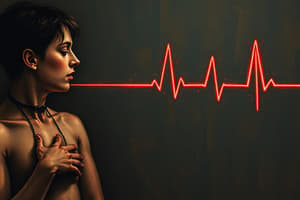Podcast
Questions and Answers
What is the opposite action of cholinergic agonists?
What is the opposite action of cholinergic agonists?
Anticholinergics
Which of these effects is NOT caused by anticholinergics? (Select all that apply)
Which of these effects is NOT caused by anticholinergics? (Select all that apply)
- Increased heart rate
- Dilated pupils
- Decreased salivation
- Increased motility (correct)
- Decreased secretions
What is the mechanism of action of anticholinergics?
What is the mechanism of action of anticholinergics?
They block acetylcholine receptors.
What is the name of the drug that is a non-selective anticholinergic?
What is the name of the drug that is a non-selective anticholinergic?
What is a common use for atropine?
What is a common use for atropine?
Which of the following is NOT a common side effect of atropine?
Which of the following is NOT a common side effect of atropine?
Which drug is used to treat Parkinson's Disease?
Which drug is used to treat Parkinson's Disease?
What is the main action of Benztropine?
What is the main action of Benztropine?
Benztropine's side effects are very similar to those of Atropine
Benztropine's side effects are very similar to those of Atropine
Which drug is used to treat overactive bladder?
Which drug is used to treat overactive bladder?
What is a common intervention for patients on anticholinergic drugs?
What is a common intervention for patients on anticholinergic drugs?
It is important to monitor the urinary output of patients on anticholinergics.
It is important to monitor the urinary output of patients on anticholinergics.
What is a common teaching point for patients on anticholinergics?
What is a common teaching point for patients on anticholinergics?
What is the main purpose of evaluation for patients on anticholinergic drugs?
What is the main purpose of evaluation for patients on anticholinergic drugs?
What should the nurse monitor for in a patient taking atropine?
What should the nurse monitor for in a patient taking atropine?
What should the nurse monitor for in a patient taking Benztropine?
What should the nurse monitor for in a patient taking Benztropine?
What should the nurse monitor for in a patient taking Tolterodine?
What should the nurse monitor for in a patient taking Tolterodine?
Flashcards
Cholinergic Antagonists
Cholinergic Antagonists
Drugs that block the action of acetylcholine, a neurotransmitter in the body.
Anticholinergics
Anticholinergics
Drugs that block the effects of acetylcholine at various sites in the body.
Atropine
Atropine
A specific anticholinergic drug used to increase heart rate and decrease secretions.
Anticholinergic Side Effects
Anticholinergic Side Effects
Signup and view all the flashcards
Anticholinergic Contraindications
Anticholinergic Contraindications
Signup and view all the flashcards
Anticholinergic - Antiparkinson's
Anticholinergic - Antiparkinson's
Signup and view all the flashcards
Benztropine
Benztropine
Signup and view all the flashcards
Tolterodine Tartrate
Tolterodine Tartrate
Signup and view all the flashcards
Anticholinergic Interactions
Anticholinergic Interactions
Signup and view all the flashcards
Anticholinergic Assessment
Anticholinergic Assessment
Signup and view all the flashcards
Anticholinergic Interventions
Anticholinergic Interventions
Signup and view all the flashcards
Anticholinergic Teaching
Anticholinergic Teaching
Signup and view all the flashcards
Anticholinergic Evaluation
Anticholinergic Evaluation
Signup and view all the flashcards
Study Notes
Cholinergic Antagonists (Anticholinergics)
- Cholinergic antagonists, also called anticholinergics or cholinergic blockers, act opposite to cholinergic agonists.
- They inhibit the action of acetylcholine.
- They increase heart rate.
- They cause bronchodilation and reduce secretions.
- They decrease gastrointestinal (GI) motility and peristalsis, reducing GI secretions.
- They increase bladder sphincter constriction.
- They dilate pupils.
- They decrease salivation and perspiration.
- They decrease tremors and rigidity.
Anticholinergics - Atropine
-
Action: Non-selective; inhibits acetylcholine by occupying receptors; increases heart rate by blocking vagal nerve stimulation.
-
Uses: Decreasing salivation and respiratory/GI secretions before surgery; increasing heart rate in bradycardia; dilating pupils for eye exams.
-
Side effects/Adverse reactions: Dry mouth and skin; inability to sweat; flushing; blurred vision; constipation; urinary retention; palpitations; hypertension.
Anticholinergic Antiparkinson's - Benztropine
-
Action: Blocks acetylcholine in skeletal muscles; blocks dopamine reuptake, allowing longer dopamine activity.
-
Uses: Decreasing involuntary muscle movement, tremors, and rigidity; Parkinson's disease; pseudoparkinsonism.
-
Side effects/Adverse reactions: Symptoms very similar to atropine.
-
Contraindications: Glaucoma; tardive dyskinesia; myasthenia gravis; psychosis.
-
Interactions: Other anticholinergic drugs; drugs increasing heart rate and blood pressure.
Anticholinergic - Tolterodine Tartrate
-
Action: Selectively blocks cholinergic receptors in the bladder.
-
Uses: Overactive bladder; decreasing urinary frequency, urgency, and incontinence.
-
Side effects/Adverse reactions: Similar to atropine.
-
Contraindications: Similar to atropine.
-
Interactions: Grapefruit juice can increase drug levels.
Anticholinergic Drug Assessment
- Assessment: Vital signs; medication/medical history; reason for medication; urine output.
Anticholinergic Drug Interventions
- Interventions: Monitor vital signs (especially for tachycardia); monitor intake and output (for urinary retention); monitor bowel status (for constipation); provide mouth care; dilute intravenous atropine in sterile water and administer slowly (at least 1 mg/minute).
Teaching Clients about Anticholinergic Drugs
- Teach the client to: Avoid hot environments; increase fluid and fiber intake; report decreased urine output; use hard candy for dry mouth; practice good oral care; wear sunglasses; avoid driving until understanding the drug effects (which may cause drowsiness).
Anticholinergic Drug Evaluation
- Evaluation: Important to understand why the nurse gave the medication and if it's having the desired effect (therapeutic effect).
- Atropine: Evaluate if heart rate increased if bradycardic before surgery; evaluate if there are dry mouth complaints.
- Benztropine: Evaluate for decreased involuntary movement.
- Tolterodine Tartrate: Evaluate for decreased bladder irritability and fewer trips to the bathroom with balanced intake and output.
Studying That Suits You
Use AI to generate personalized quizzes and flashcards to suit your learning preferences.




